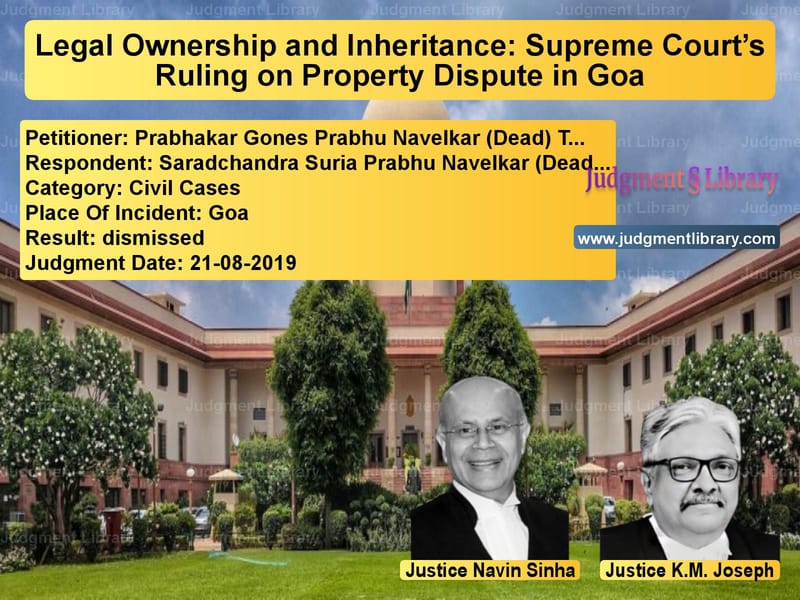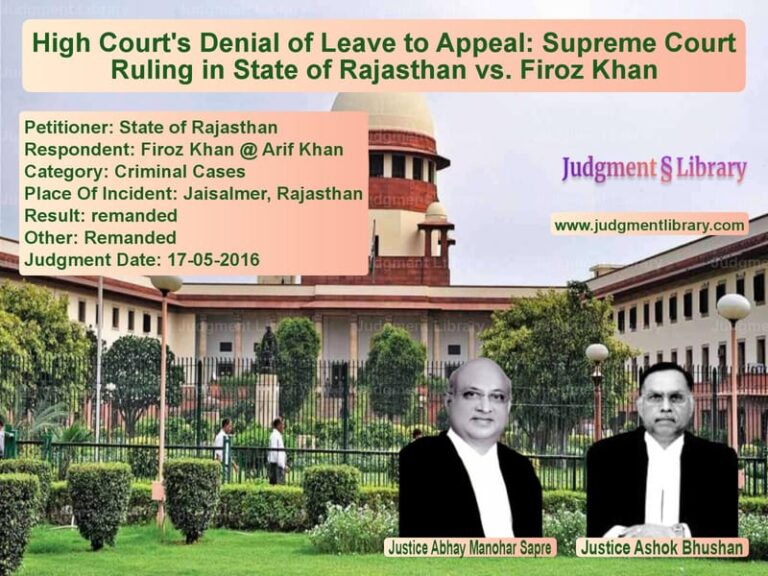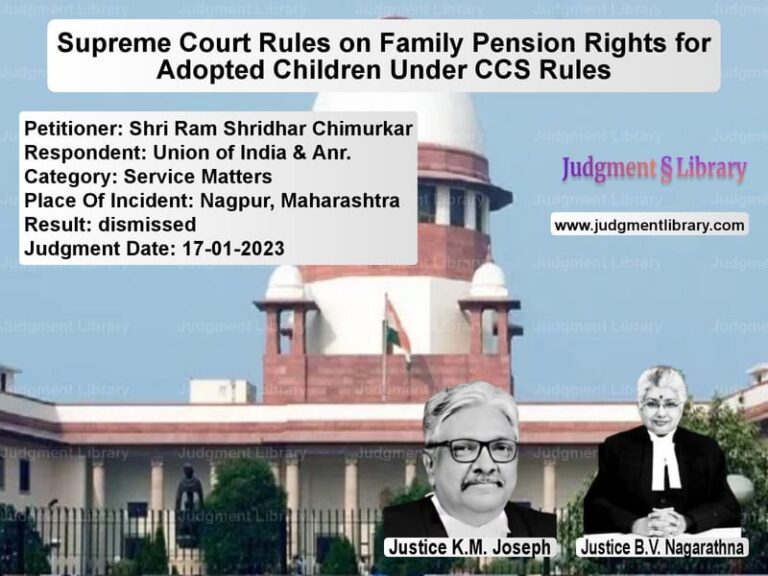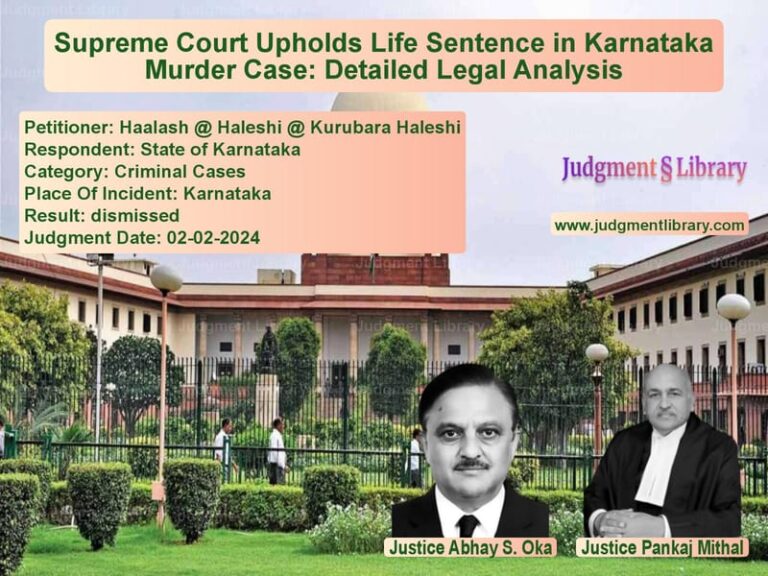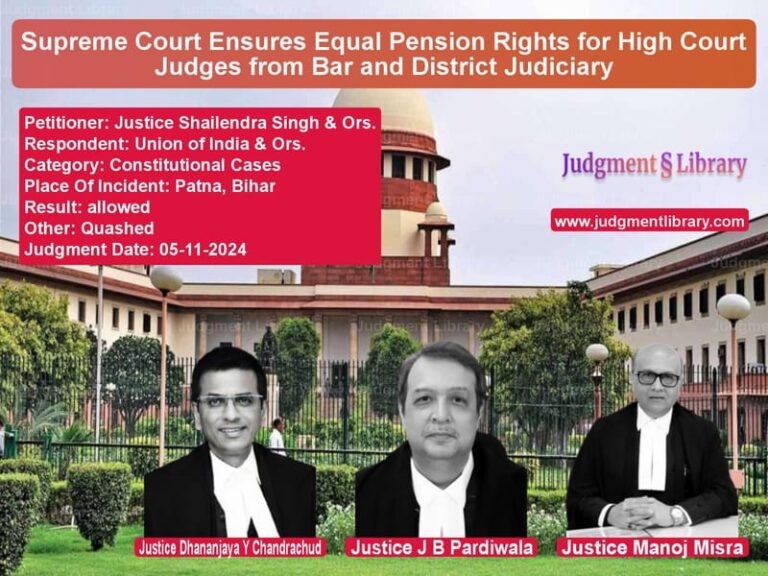Legal Ownership and Inheritance: Supreme Court’s Ruling on Property Dispute in Goa
The Supreme Court of India, in its judgment dated August 21, 2019, in the case of Prabhakar Gones Prabhu Navelkar (Dead) Through LRs & Ors. v. Saradchandra Suria Prabhu Navelkar (Dead) Through LRs & Ors., dealt with a long-standing property dispute over ownership and inheritance rights concerning two properties—Mollans and Bainguinim—located in Goa. The judgment addressed crucial legal issues, including adverse possession, acknowledgment of ownership, and the applicability of the Portuguese Civil Code in determining property rights in Goa.
Background of the Case
The dispute revolved around the claim of ownership by the plaintiffs, who argued that their predecessor, Gones, had an acknowledged share in the property but was wrongfully excluded from ownership and possession. The properties in question were originally acquired in 1915 by Suriaji, Gones’ elder brother. The plaintiffs contended that through a deed dated 21.01.1919, Suriaji acknowledged Gones’ half-share in the property. However, the defendants argued that since Gones never exercised his right to transfer ownership in his name nor contested subsequent inheritance proceedings, his claim was barred by law.
Legal Questions Before the Court
The case raised significant legal questions, including:
- Whether an acknowledgment of ownership without formal transfer confers a legal title.
- Whether prolonged inaction and failure to challenge inheritance proceedings led to extinguishment of rights.
- The impact of the Portuguese Civil Code on property disputes in Goa.
Plaintiffs’ Arguments
The plaintiffs contended:
- Acknowledgment of Ownership: They argued that the 1919 deed served as a valid acknowledgment of Gones’ ownership rights, giving him an equal share in the property.
- Unjust Enrichment by Defendants: The defendants, by retaining the entire property, had unfairly benefited at the cost of Gones’ rightful share.
- Fraud in Inheritance Proceedings: The plaintiffs alleged that the inventory proceedings conducted after Suriaji’s death were invalid as they did not consider Gones’ rightful share.
- Applicability of the Limitation Act: The plaintiffs contended that the delay in asserting their rights should not be a bar to their claim, as property rights cannot be lost solely due to inaction.
Defendants’ Arguments
The respondents (defendants) strongly opposed the claim, arguing:
- No Formal Transfer of Title: The 1919 deed only contained an acknowledgment of ownership, but no legal steps were taken by Gones to effectuate the transfer.
- Doctrine of Negative Prescription: Under the Portuguese Civil Code, rights could be lost through negative prescription (adverse possession) if not exercised within a specified period.
- Acquiescence to the Inheritance Proceedings: Gones never contested the inventory proceedings after Suriaji’s death, which meant that he accepted the legal distribution of the property.
- Doctrine of Laches: The plaintiffs’ claim, filed decades after the dispute arose, was barred due to unreasonable delay.
Supreme Court’s Observations
The Court analyzed the case based on property law principles, adverse possession doctrines, and the Portuguese Civil Code. It made the following key observations:
1. Mere Acknowledgment Does Not Confer Ownership
The Court held that acknowledgment of ownership in the 1919 deed did not automatically confer title to Gones. The document explicitly stated that Gones’ right was contingent upon repaying Rs. 1,000/- to his brother, which was never fulfilled.
“An acknowledgment of ownership, without compliance with conditions necessary for title transfer, does not create legal ownership.”
2. Inheritance Proceedings Were Final
The Court found that after Suriaji’s death, the inventory proceedings legally transferred the property to his widow, Shantibai. Since Gones never challenged these proceedings, his claim was extinguished.
“A party who does not contest inheritance proceedings at the relevant time cannot reopen them decades later based on belated claims.”
3. Doctrine of Negative Prescription Applies
The Court noted that under the Portuguese Civil Code, which governed Goa before its liberation, rights could be lost through negative prescription (failure to assert ownership within a specified period). The Court held that Gones’ inaction for decades meant he had lost his rights.
“The doctrine of negative prescription ensures that property disputes do not remain unsettled indefinitely.”
4. Plaintiffs Were Guilty of Laches
The Court emphasized that the plaintiffs had delayed their claim for several decades, despite knowing about the inheritance proceedings.
“Courts must discourage claims that arise after undue delay, especially when the claimants have had ample opportunity to assert their rights earlier.”
Final Verdict
The Supreme Court dismissed the appeal, holding:
- The plaintiffs failed to establish legal ownership based on the 1919 acknowledgment deed.
- Gones’ failure to challenge the inheritance proceedings resulted in the extinction of his rights.
- The principle of negative prescription applied, and Gones’ rights, if any, had lapsed.
- The plaintiffs’ claim was barred by laches and acquiescence.
Impact of the Judgment
This ruling sets an important precedent in property law:
- Emphasizing Timely Assertion of Rights: The decision underscores the importance of asserting legal rights within a reasonable period.
- Recognition of Negative Prescription: The ruling clarifies that property rights can be lost if not exercised within the prescribed time.
- Finality of Inheritance Proceedings: The Court reaffirmed that once inheritance proceedings attain finality, they cannot be reopened after decades.
Conclusion
The Supreme Court’s decision in Prabhakar Gones Prabhu Navelkar v. Saradchandra Suria Prabhu Navelkar is a landmark ruling in property law. It establishes that mere acknowledgment of ownership does not create legal title and that failure to assert rights within the prescribed period results in forfeiture. The judgment serves as a cautionary precedent for those who delay asserting property claims, reinforcing the principles of legal certainty and finality in judicial proceedings.
Petitioner Name: Prabhakar Gones Prabhu Navelkar (Dead) Through LRs & Ors..Respondent Name: Saradchandra Suria Prabhu Navelkar (Dead) Through LRs & Ors..Judgment By: Justice Navin Sinha, Justice K.M. Joseph.Place Of Incident: Goa.Judgment Date: 21-08-2019.
Don’t miss out on the full details! Download the complete judgment in PDF format below and gain valuable insights instantly!
Download Judgment: Prabhakar Gones Prab vs Saradchandra Suria P Supreme Court of India Judgment Dated 21-08-2019.pdf
Direct Downlaod Judgment: Direct downlaod this Judgment
See all petitions in Property Disputes
See all petitions in Succession and Wills
See all petitions in Landlord-Tenant Disputes
See all petitions in Specific Performance
See all petitions in Damages and Compensation
See all petitions in Judgment by Navin Sinha
See all petitions in Judgment by K.M. Joseph
See all petitions in dismissed
See all petitions in supreme court of India judgments August 2019
See all petitions in 2019 judgments
See all posts in Civil Cases Category
See all allowed petitions in Civil Cases Category
See all Dismissed petitions in Civil Cases Category
See all partially allowed petitions in Civil Cases Category

